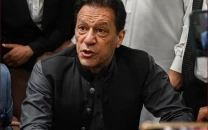World Mental Health Day: Psychologically ill patients left out in the cold
Few facilities for treating mental disorders.

Few facilities for treating mental disorders.
If an individual behaves in an unusual way, he is either left out or in extreme cases tagged as a ‘pagal’. No one cares to inquire about the root cause of the person’s illness or take steps to treat it. Every year, World Mental Health Day is observed on October 10 to create awareness about the importance of mental health and to challenge the stigma that many people with mental health issues experience.
According to the World Health Organisation (WHO) 10 to16 per cent people in Pakistan suffer from moderate psychiatric illnesses, with 1 per cent suffering from severe mental illnesses. Meanwhile, according to a year’s data gathered by the Pakistan Institute of Medical Sciences (Pims) Psychiatry department, there has been a 20 per cent increase in the number of people suffering from various mental illnesses such as anxiety and depression. Triggers include parental and marital conflicts, increasing inflation, poverty and a sense of insecurity due to increasing incidents of terrorism and sexual abuse cases.

A*, 32, suffers from depressive disorders because of parental conflict and sexual abuse. “Ever since I was born my father has abused my mother and me. When I turned nine, he sent me to a boarding school where I was sexually abused by staff members and later by my chacha (uncle),” said A. At the time she was not mature enough to understand what she had gone through, but when she grew up she became increasingly disturbed. She was left out by friends due to her aggressive personality but she felt ashamed to tell them the reason behind it.
“Every day I come across a young patient suffering from mental disorder due to parental conflict or separation, particularly an abusive father. This creates a lasting sense of insecurity, complexity, anxiety and depression among children,” said Dr Shahid Ali Khan, head of psychiatry department at NESCOM Hospital.
Data gathered by the team of Rozan Helpline service through a total number of 18,642 calls received from 2008 to to date from youth aged between 19-29, from across the country shows 19.34% were suffering from anxiety, mood disturbances, sleep disorders, grief, loss and stress, which resulted in poor social networks. Some of them attempted suicide. Meanwhile, 49.9% had psycho-social and psycho-sexual concerns caused due to relationships, family or peer issues, sexual thoughts or homosexuality which resulted in a lack of self-confidence, violence, marital conflicts and adjustment problems.

“Our youth suffers more due to the absence counselling services. They either feel ashamed or scared to talk to their parents or are misguided by their peers and do not seek treatment, this ultimately destroy their personality,” said Zehra, who is working as a counsellor at Rozan Helpline service.
Dr Rizwan Taj, Head of Psychiatry Department at Pakistan Institute of Medical Sciences (Pims) believes that ‘breaking news’ and coverage of terrorist activity on the channel is increasing the level of anxiety and insecurity among people of all ages. People don’t work out as much, they have reduced their social networking, hours of sleep which also causes anxiety and depression.
However the government does not seem much concerned about the mental health of its people which is reflected through the absence of a national policy on mental health. Mentally disturbed people are forced to suffer mostly in silence because of the lack of facilities available for treatment of psychlogical disorders, particularly outside cities.
* Name withheld to protect identity
Published in The Express Tribune, October 11th, 2013.



















COMMENTS
Comments are moderated and generally will be posted if they are on-topic and not abusive.
For more information, please see our Comments FAQ